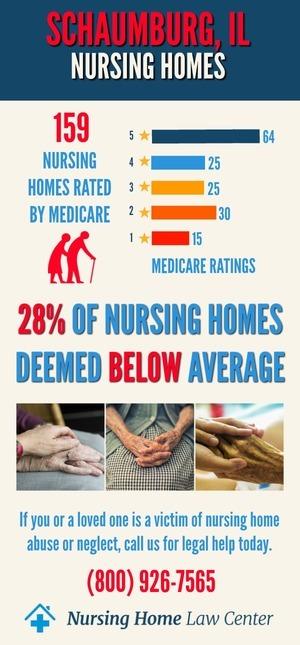The Nursing Home Law Center is committed to providing the legal resources necessary to hold negligent facilities accountable.
Schaumburg Nursing Home Abuse Lawyer

Licensed in Illinois
Nursing home abuse is a devastating issue that affects many nursing home residents in Schaumburg, IL, and across Cook County. Families trust nursing homes to provide care and protection for their loved ones, but unfortunately, their trust is sometimes violated, leading to physical, emotional, and financial harm.
If you suspect that a family member has suffered abuse or neglect in a nursing home facility, it’s critical to seek legal representation from an experienced nursing home abuse lawyer.
Why Hire Nursing Home Law Center
At Nursing Home Law Center, we are dedicated to pursuing justice and recovering compensation for victims of nursing home abuse. Our experienced legal team has a strong record of handling abuse cases with care and achieving substantial settlements and verdicts.
We thoroughly investigate each case to address all aspects of the abuse, including medical expenses, emotional distress, and other damages. With our extensive knowledge of nursing home abuse claims, we navigate the legal process efficiently and work relentlessly to defend your rights.
Throughout the case, we offer compassionate and clear communication, ensuring you and your family stay informed, supported, and confident at every step.
Types of Cases Handled by Our Schaumburg Nursing Home Abuse Lawyers

Elder abuse refers to any intentional harm, neglect, or exploitation inflicted on an older person in a nursing facility. Our Schaumburg, Illinois, nursing home abuse attorneys handle a variety of abuse cases, including:
- Physical abuse involves a caregiver intentionally harming a resident through actions such as hitting, slapping, or improperly using restraints. Physical abuse often results in unexplained injuries, such as bruises or broken bones.
- Mental and emotional abuse involves verbal threats, humiliation, or intimidation, causing emotional distress in a nursing home resident. Signs of psychological abuse include fear, anxiety, or withdrawal from social activities.
- Sexual abuse in a nursing home facility involves any non-consensual sexual contact with a resident. This act is a particularly traumatic form of abuse, often affecting nursing home residents with cognitive impairments who may be unable to defend themselves or report the abuse.
- Medical malpractice includes failure to provide appropriate medical care, which can lead to bed sores, infections, or medication errors.
- Negligence in nursing homes occurs when a facility fails to provide basic care, such as adequate nutrition, hygiene, or supervision. Neglect can lead to malnutrition, dehydration, falls, and elopement (when a resident wanders out of the assisted living facility).
- Financial abuse occurs when caregivers or other individuals illegally take advantage of a resident’s economic situation. This exploitation can involve stealing money, forging signatures, or pressuring residents into bad financial decisions.
- Wrongful death happens when nursing home neglect or abuse leads to the untimely death of a nursing home resident. Family members can seek compensation for the loss of their loved one and hold the responsible parties accountable through a wrongful death claim.
Understanding Your Legal Rights
Under federal and state laws, nursing home residents have specific legal rights to ensure their safety and well-being.
The Nursing Home Reform Act of 1987 requires nursing homes to provide quality care and protect residents from abuse and neglect. Additionally, state laws overseen by the Illinois Department of Public ensure that senior citizens of Illinois nursing homes are treated with dignity and respect.
The resident can file a nursing home neglect claim if these rights are violated. A family member or legal representative can also take legal action on their behalf.
Liability in Nursing Home Neglect and Abuse Cases
Multiple parties may be liable for elder abuse, depending on the circumstances of the case. For example:
- Nursing homes can be held liable if they fail to conduct proper background checks on employees or if they do not provide adequate staffing levels, leading to harm.
- Nursing home employees may be personally responsible for engaging in physical abuse, emotional abuse, or financial exploitation of residents.
- Third-party contractors providing medical services or other care in assisted living facilities may also be held accountable if their negligence harms a resident.
How Our Schaumburg Nursing Home Abuse Lawyers Can Help
Our Schaumburg, Illinois, nursing home abuse attorneys are committed to helping families seek justice and recover compensation for the harm their loved ones have suffered. Here’s how we can assist:
- Free Case Evaluation: We offer a free consultation to review your case, answer your questions, and discuss your legal options. This evaluation is provided at no cost to you.
- Case Investigation: Our personal injury attorneys will conduct a thorough investigation into the abuse, gathering evidence such as medical records, witness statements, and facility reports to build a strong case.
- Filing the Claim: We will file a nursing home negligence claim on your behalf once the evidence is gathered. Our legal team handles all the necessary paperwork and ensures your claim is filed within the required deadlines.
- Settlement Negotiation: Many nursing home neglect cases are resolved through settlement negotiations. Our personal injury attorneys will negotiate with the nursing home and their insurers to secure a fair settlement covering medical costs, pain and suffering, and other damages.
- Trial Representation: We are fully prepared to take your case to trial if a fair settlement cannot be reached. Our personal injury attorneys will represent you in court to ensure your loved one receives justice.
Common Signs of Elder Abuse Among Nursing Home Residents
Of Schaumburg’s 226 Medicare-approved nursing homes, 107 facilities (47%) are struggling with their overall ratings. Specifically, 95 nursing homes (42%) fall short in health inspections, and 154 facilities (68%) have inadequate staffing. 58 nursing homes (26%) rated poorly in quality measures. [1]
The worst-rated nursing homes in Schaumburg include:
| Alden Estates of Naperville | Alden Lakeland Rehab & Hcc |
| Alden Town Manor Rehab & Hcc | Alta Rehab at Fairmont |
| Aperion Care Forest Park | Aperion Care Hillside |
| Aperion Care Lakeshore | Aperion Care Niles |
| Archer Heights Healthcare | Atrium Health Care Center |
| Austin Oasis | Beacon Care and Rehabilitation |
| Bella Terra Bloomingdale | Bella Terra Morton Grove |
| Berkeley Nursing & Rehab Center | Briar Place Nursing |
| Bria of Elmwood Park | Bria of Westmont |
| Bridgeway Senior Living | California Terrace |
| Center Home Hispanic Elderly | Chateau Nrsg & Rehab Center |
| Citadel of Skokie | Claridge Healthcare Center |
| Continental Nursing & Rehab Center | Crescent Care of Elgin |
| Downers Grove Rehab & Nursing | Elevate Care Chicago North |
| Elevate Care Niles | Elevate Care North Branch |
| Elevate Care Riverwoods | Foster Health & Rehab Center |
| Grove of Elmhurst | Grove of St Charles |
| Irving Park Living & Rehab Ctr | Lakefront Nursing & Rehab Ctr |
| Lakeview Rehab & Nursing Center | Little Village Nrsg & Rhb Ctr |
| Mayfield Care and Rehab | Meadowbrook Manor – Naperville |
| Oak Park Oasis | Park View Rehab Center |
| Pavilion of Logan Square | Pearl of Elk Grove |
| Pearl of Elgin | Pearl of Hillside |
| Pearl of Hinsdale | Pearl of Montclare |
| Pearl of Naperville | Pearl of Orchard Valley |
| Pearl of St Charles | Peterson Park Health Care Ctr |
| River View Rehab Center | Ryze West |
| Sheridan Village Nrsg & Rhb | South Elgin Rehab & Hcc |
| Thrive of Lake County | Tower Hill Healthcare Center |
| Uptown Care and Rehabilitation | Warren Park Health & Living Ctr |
| Wealshire Ctr of Excellence | West Chicago Terrace |
| Westmont Manor Hlth & Rhb | Zahav of Berwyn |
| Zahav of Des Plaines |
Elder abuse in assisted living facilities can take many forms, and it is important to be aware of the warning signs to protect your loved ones.
- Bruises, cuts, or welts
- Fractures or broken bones
- Signs of internal bleeding
- Pressure ulcers or bedsores
- Sudden weight loss
- Feelings of anxiety or depression
- Withdrawal from usual social interactions
What to Do If You Suspect Nursing Home Abuse
If you suspect that a loved one is being abused or neglected in a Schaumburg nursing home, follow these steps:
- Call 911 if Immediate Danger Exists: Contact emergency services if the resident is in immediate physical danger.
- Report the Abuse to the Nursing Home Administrator: Notify the facility’s management of your concerns and document the interaction.
- File a Complaint with Your Local Ombudsman’s Office: The Ombudsman advocates for residents’ rights and investigates reports of abuse or neglect.
- Contact a Nursing Home Abuse Lawyer: Speak with an experienced Schaumburg nursing home abuse lawyer to explore your legal options.
Damages You Can Recover Through a Nursing Home Abuse Claim
Victims of elder abuse can recover several types of damages, including:
- Economic damages to cover medical expenses and other costs related to the abuse.
- Non-economic damages for pain and suffering, emotional distress, and loss of enjoyment of life.
- Punitive damages to punish the responsible parties for egregious misconduct.
The Cost of Hiring a Schaumburg Nursing Home Abuse Lawyer
We understand the financial strain that family members face when pursuing legal action. That’s why our law firm works on a contingency fee basis, meaning you only pay if we successfully recover compensation for your case.
You Have Limited Time to Take Legal Action in Schaumburg
In Illinois, a statute of limitations limits the time you have to file a nursing home negligence lawsuit. Generally, you have two years from the date of the injury or discovery of the abuse to take legal action.
Contact a Schaumburg Nursing Home Abuse Attorney Today!
At Nursing Home Law Center, our Illinois nursing home lawyers are dedicated to seeking justice and compensation. Contact us today for a free consultation, and let us help you hold those responsible accountable for the harm caused to your loved one.
Call us at (800) 926-7565 or complete our contact form.
References: [1] Medicare

